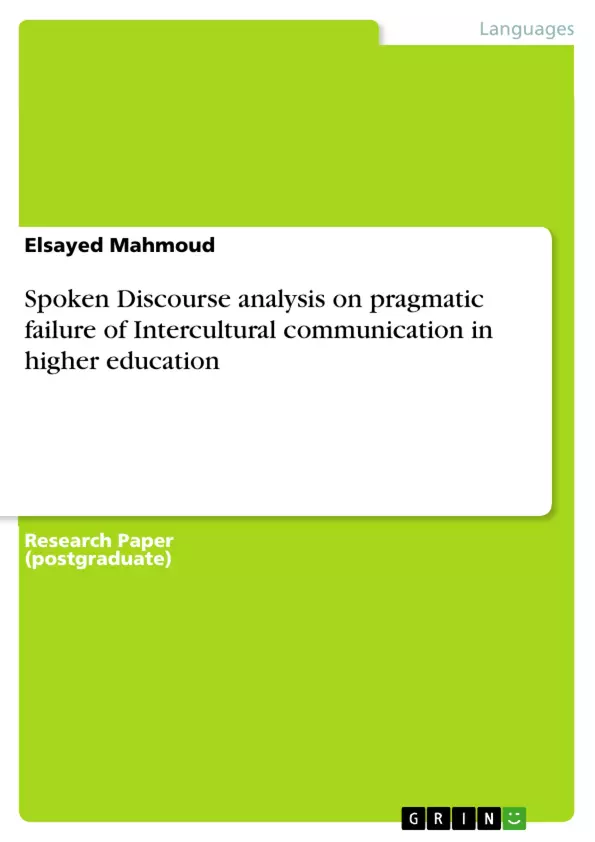The issue of intercultural awareness in education has become recently debatable between the researchers, authors and Discourse analysts in the last few decades as a result of its importance in all forms of education for a better future. This led to that the year of 2008 to be the European year of intercultural dialogue.
Based on the debate between the researchers that acquiring English does not have to be separated from acquiring the culture that it formulates, this paper analyzes the spoken discourses between people belong to different contexts to emphasize on the importance of including intercultural competence in the educational pedagogy and the problems that could occur in its absence.
Inhaltsverzeichnis (Table of Contents)
- Background of the Study
- Introduction
- A rationale for the choice of topic
- Purpose of the Study
- Significance of the Study
- Questions of the study
- Literature Review
- Intercultural competence (ICC), Discourse and pragmatic competence
- Cultural studies and Discourse analysis
- Methodology
- Data analysis of spoken discourse
- Cultural words
- Sentence level
- Discourse level
- Intonation
- Discussion
- Pedagogical implications
- Conclusion
Zielsetzung und Themenschwerpunkte (Objectives and Key Themes)
This research paper aims to analyze spoken discourses between people from different cultural contexts to emphasize the importance of including intercultural competence in educational pedagogy and the potential problems that could arise in its absence. The study focuses on the pragmatic failures that can occur when cultural awareness is lacking.
- The importance of intercultural awareness in English language learning and teaching
- The analysis of pragmatic failure in spoken discourse across different cultural backgrounds
- The definition and exploration of intercultural competence, pragmatic competence, and discourse analysis
- The relationship between discourse analysis and culture
- Pedagogical implications for English language educators and learners
Zusammenfassung der Kapitel (Chapter Summaries)
- Background of the Study: This chapter introduces the growing importance of intercultural awareness in education, highlighting the need for a deeper understanding of cultural influences on communication. It emphasizes the potential for pragmatic failure when cultural differences are not considered.
- Literature Review: This chapter explores various theoretical frameworks for understanding intercultural communication, including ethnography of speaking, cross-cultural attitude approaches, and cultural identity approaches. It examines the intersection of culture and discourse analysis, drawing on the work of key figures like Dell Hymes.
- Methodology: This chapter outlines the research methodology used for analyzing spoken discourse. The focus is on identifying pragmatic failures through an examination of cultural words, sentence structure, discourse patterns, and intonation.
- Data analysis of spoken discourse: This chapter presents a detailed analysis of spoken discourse, examining specific examples of pragmatic failure based on cultural differences in word choice, sentence structure, discourse patterns, and intonation.
- Discussion: This chapter discusses the findings of the analysis, highlighting key patterns and insights into the impact of cultural differences on communication. It explores the implications for intercultural competence and the potential for misunderstandings in educational settings.
- Pedagogical implications: This chapter proposes practical pedagogical recommendations for English language educators and learners based on the findings of the study. It emphasizes the importance of fostering intercultural awareness and developing communicative competence that transcends cultural boundaries.
Schlüsselwörter (Keywords)
The key concepts explored in this research include intercultural competence, pragmatic failure, discourse analysis, cultural studies, ethnography of speaking, and the pedagogical implications for English language teaching and learning. The study focuses on the intersection of language, culture, and communication, examining the importance of cultural awareness for effective communication in diverse contexts.
Frequently Asked Questions
What is pragmatic failure in intercultural communication?
Pragmatic failure occurs when a speaker's intended meaning is misunderstood by a listener from a different culture due to differences in social norms and communication styles, even if the grammar is correct.
Why is intercultural competence important in education?
It is crucial because acquiring a language cannot be separated from acquiring its culture. Without intercultural competence, learners may struggle to communicate effectively in global contexts.
How does discourse analysis relate to culture?
Discourse analysis examines how language is used in social contexts, revealing how cultural identity and background shape communication patterns and expectations.
What are the linguistic levels where pragmatic failure can be observed?
Pragmatic failure can be analyzed through cultural word choices, sentence structure, discourse patterns, and even intonation variations.
What are the pedagogical implications of this study?
Educators should integrate cultural awareness into language teaching to help students develop communicative competence that transcends purely linguistic knowledge.
- Quote paper
- Elsayed Mahmoud (Author), 2016, Spoken Discourse analysis on pragmatic failure of Intercultural communication in higher education, Munich, GRIN Verlag, https://www.grin.com/document/343658



